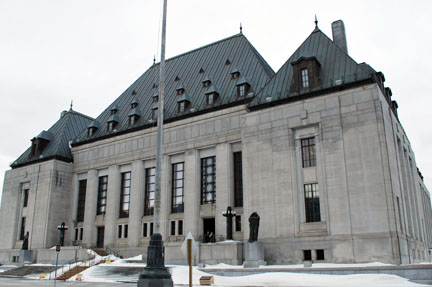This week, the Supreme Court of Canada will hear four appeals. Three of these are related, involving a potentially huge class action against credit card companies based on the legality of “conversion charges” under the Consumer Protection Act.
 Feb. 12
Feb. 12 — Alberta —
Bhasin v. HrynewCivil law: The individual respondent, Larry Hrynew, and corporate respondent, Canadian American Financial Corp., were found liable of civil conspiracy against the respondent, Harish Bhasin, by the Alberta Court of Queens’ Bench. CAFC sought to have Hrynew audit Bhasin’s business, but Bhasin refused to hand over confidential information to Hrynew, a competitor. CAFC then gave notice it would not be renewing Bhasin’s contract. The Court of Appeal dismissed Bhasin’s suit, finding the lower court neglected the unambiguous nature of their contract.
Read the
Alberta Court of Appeal’s decisionRelated legal bulletin:
Appeal Watch: SCC likely to clarify contractual interpretation and good faith in Bhasin v. Hrynew, The Court
Feb. 13 — Quebec —
Bank of Montreal v. Marcotte;
Amex Bank of Canada v. Adams, and
Marcotte v. Fédération des caisses Desjardins du QuébecConstitutional law: Plaintiffs in this class action allege various banks breached the Consumer Protection Act by refusing to define their credit cards’ foreign-exchange conversion charges as “credit charges.” The act requires credit charges be included in the overall credit rate. Moreover, plaintiffs argue that, defined as a credit charge, the conversion charges are subject to a 21-day grace period. The banks argue the conversion charges are not credit charges, and even if they were, the act is constitutionally inapplicable under the interjurisdictional immunity doctrine and inoperative under the paramountcy doctrine. The SCC will review whether bank-issued credit cards are governable under the Consumer Protection Act.
Read the
Quebec Court of Appeal’s decisionRelated news story:
In this battle between banks and consumers, turf matters,
Wall Street Journal

 Feb. 12 — Alberta — Bhasin v. Hrynew
Feb. 12 — Alberta — Bhasin v. Hrynew